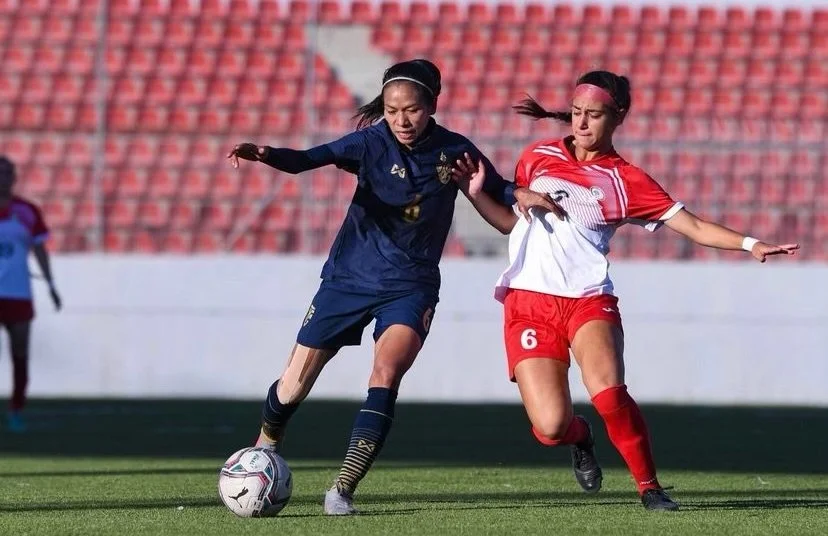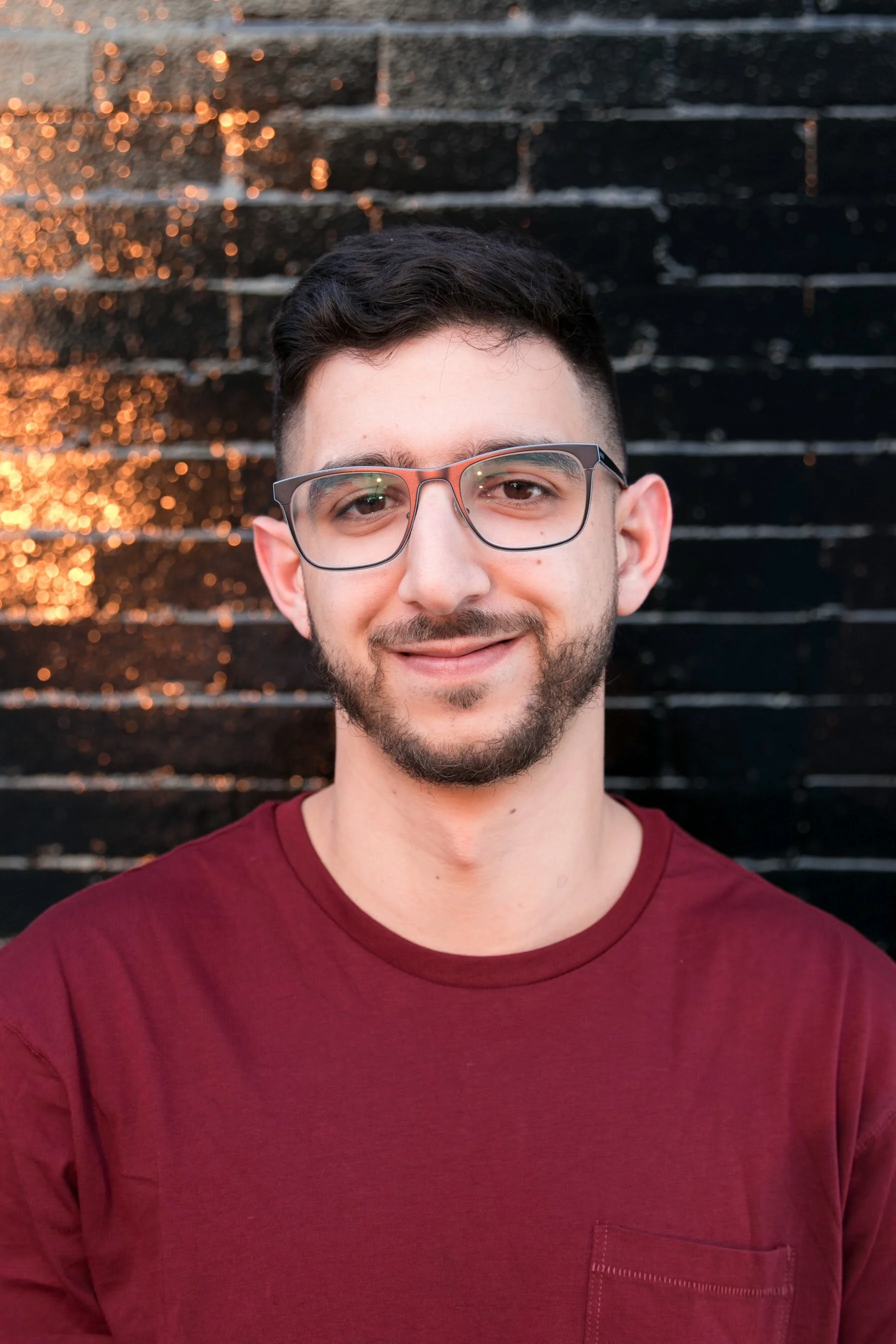Tina El-Amoor: Hard work, dedication, and believing in yourself
The following was originally published in our latest Sports Edition. Support Palestine in America by downloading a digital version, purchasing a physical copy or become a subscriber for $5 a month.
Tina El-Amoor recruited herself onto the Palestinian national team in 2017, and the “trial” went so well, she’s been on the team ever since.
“I'd never heard anything about a women's team for [Palestine]. I just didn't know that existed, and I didn’t know that was an option,” El-Amoor told Palestine in America. “So after a [coach] brought it to my attention [and] we found out who we need to reach out to, [the national team] set me up for a trial. They liked me and they kept me.”
El-Amoor was the first U.S. citizen to play with the Palestinian national team. She talked with PiA about her growing friendship with teammate Emily Ibrahim, as well as how she balances playing for a national team, Division 1 college team, and being a student at Gardner-Webb University.
Palestine in America (PiA): Where are your family from in Palestine? And where were you raised in the U.S.?
Tine El-Amoor [TE]: We're from a smaller village near Nablus called Bidya. I'm currently living in North Carolina. I was born and raised in North Carolina.
PiA: Did Gardner-Webb University recruit you?
TE: Yeah, I got recruited around my junior year of high school. And [the coach] was actually a former coach of mine. And he watched me play at a tournament and just offered me there.
PiA: How did you start playing soccer?
TE: I’m from an extremely athletic family. My family played literally every sport you could think of. I'm the youngest of four, and my siblings are much older than me. So, they were definitely role models I looked up to ,and so [to] just kind of be able to hang out with them, you kind of had to play sports. So, I started playing. I was four years old. I've been around it my whole life.
PiA: You had to play up to the level of your siblings, because you're the youngest. And if you wanted to play with them, you better be able to keep up.
TE: We're [a] very competitive family.
PiA: Are you the best soccer player in the family?
I mean, if they're watching this, I can't say that. MashAllah my siblings are actually very talented athletes, and my brother played college soccer, as well. He played at NC State.
PiA: But he didn’t play for the Palestinian national team.
TE: [Laughter] No he didn't.
PiA: Where does playing for the national team rank on your list of achievements?
TE: Honestly, it's the biggest honor that I could ever think of. [Palestine] is so near and dear to my heart, and to be able to do something in [Palestine’s] name, honestly, I don't think I can top it.
PiA: Can you give us a story that really resonated for you? Any moment while you were playing for the national team?
TE: I think the first time I got called up to the national team, I think [I] was like 17 [years old]. So, I was the youngest kid on the team, for sure. I was like, “I'm on the senior national team, and I got called up to [play in Qatar].” And I remember the first time just walking out of the tunnel, you know, the starting 11. And I just look over and actually recognize some of the players that I'm playing against. That is something that I'll never forget.
PiA: It's like stories you hear about NBA players now playing against LeBron James.
TE: I can't trade that for the world. It's the best thing I've ever done in my life.
PiA: You’ve played with the national team in Bahrain and Qatar before playing with them when Palestine hosted the Asian Football Confederation (AFC) qualifiers last year. Does playing with the team in Palestine top the other two experiences?
TE: For sure. Yeah, because I hadn't got to go back to [Palestine] in probably like four or five years. We were fortunate enough to be able to go back every summer as a kid, but then I got older, and [with] college ball and club soccer, it’s just kind of impossible to go back. You can't take those types of breaks. So, for me to get to go back, I was just so glad to be able to do that and play in front of people that know me and my family back home.
PiA: You had friends and family come out and watch you play?
TE: Yeah, I did. My uncle's got to come, and my immediate family is the only family that we have in America. So, the entire family [is] back home in Palestine, so they all watched and everything. It was really nice.
PiA: So, what was that moment like when you first stepped on the pitch in Palestine?
TE: Every time I've gone back to Palestine, I never got to play soccer there. I never saw that they had turf; the [village] that I’m from didn't have [soccer] fields or anything. So, getting to see that for the first time was really, really cool. I love that we're developing it more in Palestine and giving more opportunities [to play the game].
PiA: Did you guys play in Ramallah?
TE: We played in Ramallah for the games.
PiA: When did you arrive in Palestine for the tournament?
TE: I didn't get to come in with the whole team. Everybody was there a week before us. Me and Emily [Ibrahim] came in late because we both are in college right now. And I'm playing with my college team. So, I missed about three games with my college team to play in the tournament. But, I'm thankful for the opportunity. I can't complain.
PiA: Was your coach receptive to the idea of you going to play?
TE: Yeah. When I first got the offer to go overseas, I would [have been] missing six games. So at first, it was really, really hard. And I was like, “Coach, this is the opportunity I'm given. What would you like? Are you okay with this?” He's like, “Well, six games is tough. I don't know.”
PiA: You’re on scholarship.
TE: I'm on scholarship, exactly. I'm there to play for the university. But then, I worked it out with them. And they allowed me to come in a couple of days before the actual tournament.
PiA: They gotta balance it, because at the same time, it's a hell of an honor. Even for them, they got a Palestinian national player on their team. That's something to say. But at the same time, six games would have been tough to be missing one of your star players.
TE: But it only ended up being about three.
PiA: How is it playing collegiate ball? How would you compare the two: playing–collegiate versus being on the national level?
TE: When you play for the national team, you play against a lot older players that are veterans. They know the game really well. They're a lot more mature, usually, because they have so much experience. But in college ball, it's very, very competitive. Everybody you're playing against has also been doing the same thing you're doing — six or four years of training in and out. If you miss a day, they're not missing a day, you know? So, it's competitive; it keeps you working. You can't just get complacent.
PiA: Do you have any plans to play after college?
TE: I would love to if I had the opportunity. I would 100 percent take it. I would love to play professionally after playing with the national team.
PiA: As long as they're extending the offer, you're gonna go out there and play?
TE: I would for sure. I love it. Soccer is the one thing in my life I've consistently been doing for almost 16 years now. And I still love it. And I don't think I would want to give it up voluntarily. [It’d have to be that] physically I just could not play anymore [for me to not play].
PiA: But even if you couldn't play anymore, would you still be involved in the game?
TE: Yeah, for sure. I was coaching six-year-olds and eight-year-olds while I’m playing now. I’ve coached a middle school team before. I like just being around the game.
PiA: Are you and Emily still friends?
TE: Yeah, I was just in Chicago about a week ago. And I had lunch with her and her family.
PiA: You first met each other when Emily joined the Palestinian U-18 team?
TE: Yeah, that was the first time that Emily and I [met]. [I] remember they were like, “Here, this is a new American kid. Make sure she gets in with the crowd and everything,” because I was the first American kid they brought in. So, it was nice to have someone else from America.
PiA: Emily won the MVP award of that tournament, right?
TE: Yeah, she had an amazing showing in the U-18 team tournament.She was crazy that tournament, for sure.
PiA: Did you guys hit it off before the tournament started? Or did you guys really become good friends after she showed you how good she was?
TE: I don't think our friendship had anything to do with, “Oh, I like her because she's a good player.” I mean, that helps. She's a good player. And I love playing with her. But you know, she has an amazing personality, too. We just got along really well. And we kind of got in touch with each other because her club team had a tournament in my hometown [Raleigh]. So, the people that were with the national team told us to get in touch with each other. And, it was so nice to get to know her before then. Me and her actually went out to lunch whenever she came to Raleigh that first time. So, I knew her a couple months before we even went over to the national team. We kept in touch from there, and I got to watch her play a couple times. We just clicked, and we're good friends now. It's when you experience certain types of things with people, they become your lifelong type friends.
PiA: How did you get recruited to the national team? How did you first initially get in contact with them, or how did they get in contact with you?
So when I was playing — I don't know if you've heard of ODP. It's like the Olympic Development Program within America. So, each state has one. They'll pick the top 20 or something out of each state and put them on a team. And then they'll play other states..I was playing with those — I was on the North Carolina state team, and then I got put on the regional team at that time. And then we get put into this really big camp, with all the regions. So, one of the coaches brought it to my attention. “They were like, “Aren't you a dual citizen? “Have you thought about reaching out to them?” He kind of brought my attention to [the opportunity]. I never thought about that before. I had teammates within the region playing for Puerto Rico, playing for Mexico, because they were dual citizens, as well.




